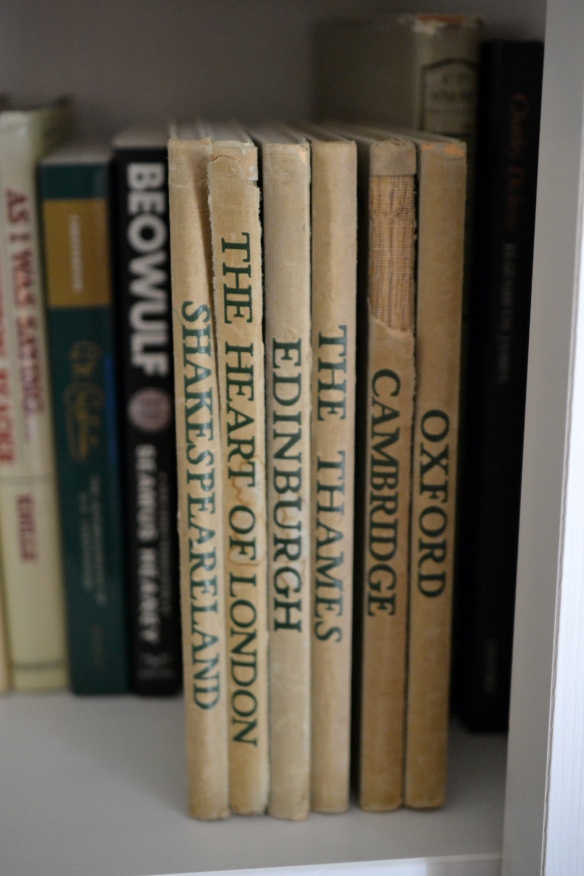
You remember that Louisa May Alcott quote, She is too fond of books and it has turned her brain? Here is a corollary: She is too too fond of matching sets.
I have a birthday coming up. One that ends in zero and exceeds half a century. Since three of my family or origin (mother, father, sister) did not live to see the birthday that is 7/10 of a century, I gave myself permission to go for the gusto in making my wishes known.
It’s extravagant. Indubitably redundant. But, oh, so resplendent. And significantly pleasant! Irrational and beautiful.
Reading all of Shakespeare this year has been such a positive experience that I plan an ‘all of { } project’ the rest of my life. And surely one of those authors is C.S. Lewis. When I saw this set I was conquered, subjugated, overwhelmed. In a season of releasing books, I gladly acquired these gems and will joyfully distribute the duplicates.
Something else made me deliriously giddy.

This is my set of commonplace journals, beginning with 2007. (I have earlier commonplace books, but, alas, they don’t match.) I had a fright when the box store which shall not be named stopped selling these. Amazon sells them, but at more than twice what I had been paying. I discovered Staples now sells them! I’m ready for four more years of quotes, wedding invitations, doodles, news clippings, and recommendations. It’s a bullet journal (sort of) that focuses more on thinking than doing. And —joy!— they match!
More glorious matchingness

The two on the left are the only remaining of the original set given me by my dad and mom, which I lent out with abandon and lost. My sister gave me the new hardbound set. It’s picky, I know, but don’t you think they could’ve made Laura Ingalls Wilder printed at the same place on the spine?

Ah, Wendell. His Port Williams stories are top shelf. The publisher didn’t get the spine design uniform, but we’ll let it go.

Barbara Tuchman makes history read like a novel. If you feel unsure about why World War 1 was fought, The Guns of August is the book to read.

Reading a set of Churchill is like going on a diet. You need time to prepare yourself mentally for the challenge. But, oh!, the words!

My sons and I gobbled up this Ralph Moody set. My oldest and I used to hide it from each other so we wouldn’t have to share it.

No one in my circle of friends, neighbors, and acquaintances uses the word jonesing. Although I know jonesing is usually used in the context of recreational drugs (at least I think it is, but my middle name is Naïve), I can confidently say that I am jonesing for the complete hardbound set by Overlook. (You won’t believe how many greenbacks are needed for these hardbacks! Click on Overlook!)

The Penguins. Friends. Hear me! Amazon sells 80 classics for $77.98!?!?!? Be still, my finger. But, seriously, that is an amazing price, and would grace any bookshelf. This is quite the discovery for a sleepy Saturday… Back to my shelf: you notice my Trollopes are divided? Yes, even the penguins editions must stay together. We can’t have top red stripes comingling with the lower white stripes.
 I found this Blackie and Son set at an Eagle River, Wisconsin antique store in 1996. I groaned because it cost $45; I wanted it, but $45 for books, beautiful watercolors notwithstanding, was not even [voice fades] blah blah blah. One of my siblings heard my groan, flipped me a fifty, and told me to buy it. This is what comes of being the youngest child, a habit I highly recommend.
I found this Blackie and Son set at an Eagle River, Wisconsin antique store in 1996. I groaned because it cost $45; I wanted it, but $45 for books, beautiful watercolors notwithstanding, was not even [voice fades] blah blah blah. One of my siblings heard my groan, flipped me a fifty, and told me to buy it. This is what comes of being the youngest child, a habit I highly recommend.
Back to the CS Lewis set. Are you wondering with me about the spine on The Weight of Glory? (see top photo) Hello, Harper One? What was that about?
[In that x3-speed radio voice at the end of commercials: …affiliate links…no extra cost…helps my habit…thanks a million…]















